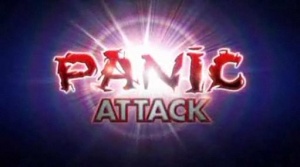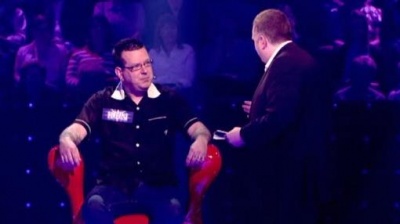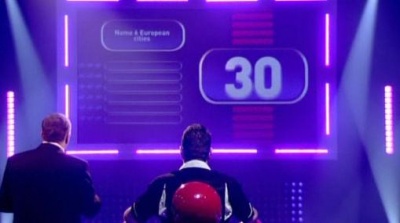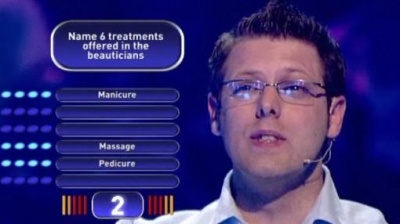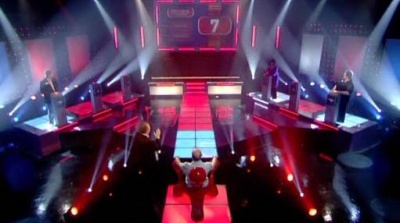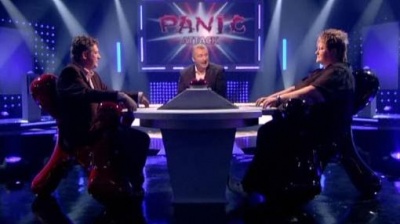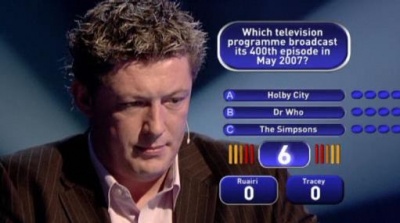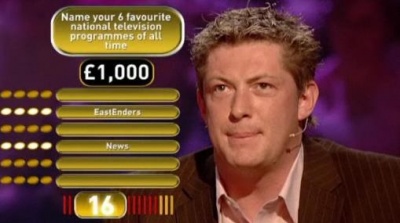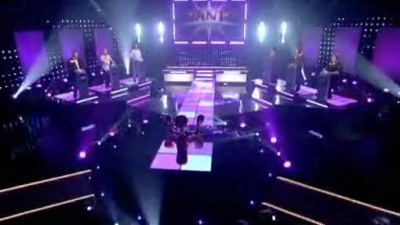Panic Attack
Contents |
Host
Broadcast
Lucky Monday for BBC One Northern Ireland, 21 April 2008 to 22 December 2009 (16 episodes in 2 series + 1 special)
Synopsis
It's not often that we cast our eyes upwards to Northern Ireland, but this gameshow - viewable around the country thanks to iPlayer and Sky's BBC regional channels - is well worth a look-in.
Contestants from all over Nor'nireland compete to get into the chair, where they control the game. The first contestant is picked at random by the computer. All they have to do to stay in the chair is to guess the top six answers of a Family Fortunes-style "We asked 100 people..." survey within 30 seconds.
If they manage this, all well and good and they stay in the chair. Even better, they get to knock out one of the other six players waiting to take their place. However, more often the player in the chair misses one or more of the most popular answers.
After the time is up, a new 10-second countdown begins, very much identical to the PokerFace bluff-off. One of the remaining contestants must buzz and find one of the remaining answers. If they're right, they get control and the original contestant is eliminated. If they're wrong, they've eliminated themselves out of the game.
One final twist: if none of the six contestants buzz within the 10 seconds, the original contestant is safe and they can eliminate any contestant they like, as punishment for them being chicken. The whole thing is played five times. It sounds complicated, but it works very well in practice and it's an extremely well-balanced round. It looks tough, nay almost impossible, to stay in until the end of the round - when just two contestants are left, and the Bit Of A Wasted Journey Pointer is twitching for some contestants who will be eliminated without hardly saying a word. However, almost always the eliminations occur due to gaps in the knowledge of the contestants, or pure stupidity, and host Nolan - an Irish radio talk show host - has great fun ramping up the drama at these points.
Round 2 is a best of 5 question multiple choice face off. The contestant who was in control after Round 1 sees a general knowledge question for 30 seconds, along with three options. They can either answer A, B or C or "Panic" by pressing a red button atop the desk.
At this point, the contestant on the other side sees the options for the first time and must answer within 10 seconds. Either way, a correct answer earns a point, an incorrect answer gives the point to the other player. Whoever scores the point gets initial control of the next question. Repeat until someone scores 3 points.
The end game sees the finalist choose from six players who are introduced via the video wall. This time the contestant has to match with the six answers provided by that one person, which makes the task very difficult - possibly too much so. The contestant has 20 seconds to answer, plus an additional 10 seconds for each answer they correctly reveal. Each correct answer wins £500, or £5000 if they get all six right.
The show makes a rather disappointing formatting error at this point. There is a button in front of the contestant which they must push before time runs out, otherwise they lose everything. However, in practice the crowd shout out when the clock goes under 5 seconds anyway, making this rule rather pointless. It would have been better if the contestant wore ear muffs, or - possibly better - the clock was hidden from the screen and you had to guess how long you had.
The programme borrows many elements from other shows, but just about maintains the momentum of the strong opening round right until the end, despite the long-ish amount of banter between questions. Nevertheless, this is more fun - much more so - than Family Fortunes ever was, and for a regional effort it's a very nicely put together package. Game show debutant Nolan does a sterling job handling the rules, questions and banter.
Why it needs to be a regional show is less clear. There are some Irish-based questions, but other than the 100 Irishers being surveyed and contestants with names like Ciaran and Rauri, it could quite easily play at 10.35pm on BBC One.
Series 2
We broke out in uncontrollable cheering when we received a contestant call asking anyone in the UK to audition for the second series. Many contestants received the grand prize of a short break in Belfast, albeit interrupted by some television recordings. Our pleasure was only slightly diminished when it took to the air in August 2009, but in Northern Ireland only, leaving us (and a fair few actual contestants) rushing back to the good old iPlayer. The series did eventually reach transmitters beyond the six counties, but not until February 2010 when it popped up in a lunchtime slot on BBC Two.
The location of the contestants wasn't the only difference, there were some significant format changes for this second run. The opening round questions rely on hard lists, such as "Name the five cities in Wales" or "Name the disciplines in the modern pentathlon". The contestant in the Chair of Power now has three seconds to change the question if they don't like the first one they see. The rest of play is unchanged - gaps can be filled by from Stealers Row, if someone's so inspired.
Round two is also slightly different. The contestant in control (the one who picked up a point last time) is shown the question, and has three seconds to decide whether to Play or Panic. If they Play, they get four options, and twenty seconds to pick over the correct answer. If the contestant chooses to Panic, the same four options appear, but this time their opponent must answer the question, and they only get five seconds.
The final game has entirely changed, though we're not convinced it's all for the better. The finalist chooses one of three categories, which leads to another solid question, such as "What are the six most abundent elements in the Earth's crust". They're given £2000 in their prize fund, but this ticks away at £100 per second. A correct answer is worth £1000, and finding all six wins the jackpot of £10,000 however much time is left.
The Panic Button has a proper use in the final. After the contestant's given three or more answers, they can press the Panic Button and stop the clock. They must then nominate one of the Stealers. That Stealer then gives one answer. If it's amongst the remaining answers on the board, the finalist and Stealer split the money remaining on the clock. If it's not, both players leave with nothing.
The net result is that the finalist is either gambling on someone else's knowledge, or running against the odds to keep the jackpot for themself. Perhaps an entirely better final would be to let the winner stop the clock and collect the cash once they've got three answers correct, let them lose it all by being greedy (or so panicked as to not get three answers in the first place). They'd win something for a decent performance, or win lots by being very good.
This series went out in a 30-minute teatime slot on BBC1 Northern Ireland, replacing the repeat of The Weakest Link inflicted on the rest of the UK.
Catchphrases
"Try not to panic"
Trivia
The show was later repeated on BBC Two from all regions between 1 to 12 February 2010

